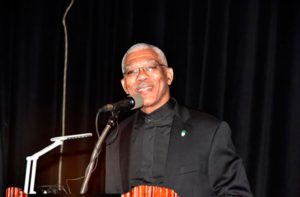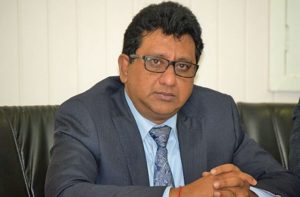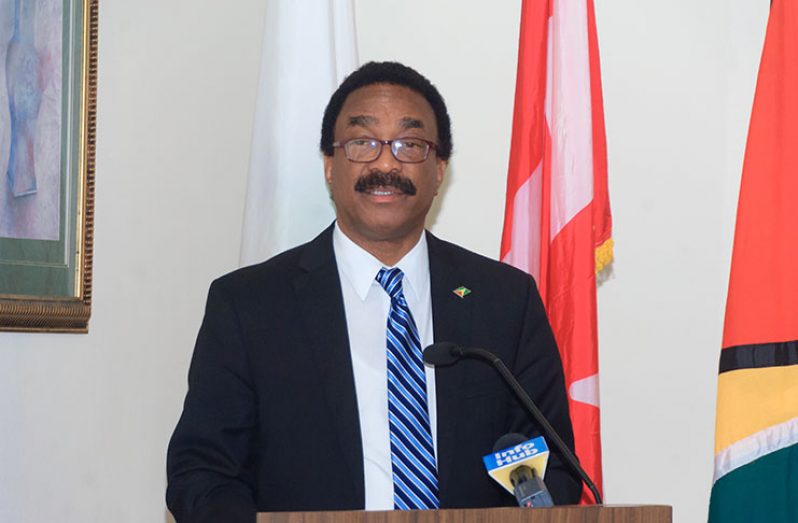…in appointment of chancellor, chief justice
…AG asserts President’s right to trigger transparent process
ATTORNEY General and Minister of Legal Affairs Basil Williams said the Judicial Service Commission (JSC) has no role in the appointment of a chancellor and chief justice, even as he asserted President David Granger’s right under the constitution in ensuring a “transparent” process to arrive at the best candidates for the two posts.
Williams made the comments in response to articles in the press earlier this week and comments by former AG Anil Nandlall, who was quoted in the Guyana Times as saying that the “lead role being taken on by President David Granger in the recruitment of the substantive positions of a Chancellor of the Judiciary and the Chief Justice is unconstitutional.” Nandlall, according to the Guyana Times, feels that the Head of State is too intimately involved in the process, considering that the constitution provides for the Judicial Service Commission to carry out this function. “This is the first political head of state that is in search of a person to fill the position of the head of a judiciary…It is the first time that a head of the executive himself is seeking to recruit a judge,” Nandlall was quoted as saying.
Misinformed
However, in rebuttal Williams said that he is taken aback that a former AG would be making such statements when the process to appoint a chancellor and chief justice has to be triggered by the President, according to the constitution. According to the Constitution, Article 127 (1) “The Chancellor and the Chief Justice shall each be appointed by the President, acting after obtaining the agreement of the Leader of the Opposition.”

The constitution went on to state that “If the office of the Chancellor or Chief Justice is vacant, or if the person holding the office of chancellor is performing the functions of the office of President, or is for any other reason unable to perform the functions of his or her office, or if the person holding the office of Chief Justice is for any reason unable to perform the functions of his or her office, then until a person has been appointed to and has assumed the functions of such office or until the person holding such office has resumed those functions as the case may be, those functions shall be performed by such other of the judges as shall be appointed by the President after meaningful consultation with the Leader of the Opposition. Additionally, Article 128 (1) states that “The judges, other than the chancellor and the chief justice shall be appointed by the President who shall act in accordance with the advice of the JSC.”
“So it is clear that under neither articles there is any role for the JSC in the appointment of the Chancellor and Chief Justice. This is a purely political process involving only two persons– the President and the Leader of the Opposition,” Williams asserted.
He said previously under the PPP the President would write the Leader of the Opposition for them to meet and at that meeting, it would be revealed who they had in mind to be Chancellor. Williams said for many years the PPP had always nominated Justice Carl Singh who never met the approval of the People’s National Congress Reform and then the A Partnership for National Unity.
Williams said when President David Granger was Leader of the Opposition in 2011, he had communicated to the then President Donald Ramotar that he was committed to a transparent process to appoint the two top judicial officers, putting forward a case for the vacancies to be advertised regionally to attract the best possible candidates. “President Granger would have surely taken into account then, the manner in which judges were handpicked under the former regime with overtures, so much so that a man was picked without due process and made an appellate judge and later it turned out that he was unfit and improper.” Williams was making reference to Rabi Sukul, who was disbarred for nine months in London after he was found guilty of intentionally misleading his client by drafting false grounds of appeal. Sukul was appointed by Ramotar in 2014 as an Appeal Court Judge. A tribunal in London had found that Sukul created false documents, knowing it was with the intention of misleading his client into believing he had grounds to appeal his conviction, when Sukul knew there were no grounds of appeal. The five-person tribunal, chaired by His Honour Michael Baker QC, found unanimously that Sukul had intentionally misled his client and engaged in conduct likely to bring the legal profession into disrepute.
Williams told the Guyana Chronicle that on reflecting on this, Mr Granger when he became President followed through with his earlier proposal to invite applications in a transparent manner and constituted a panel of eminent jurists to conduct interviews for the two posts. “We are not surprised that the PPP is against such transparency, because to avoid transparency in our court rooms, Nandlall hid a number of verbatim voice recorders paid for by the Inter-American Development Bank in the storeroom of the Ministry of Legal Affairs that were only discovered when I took office.”
Emasculate
Responding to claims that the government is trying to interfere with the work of the judiciary, Williams argued that it was under the tenure of Bharrat Jagdeo that the judiciary was emasculated. “Our judiciary you’d recall, the powers were removed from the Chief Justice’s Office and reposed in the Office of the Chancellor and then what they did, whenever there was a meeting of the Opposition Leader, Jagdeo always asserted Carl Singh to remain.” Williams said it is important that there is a dichotomy between the Chief Justice’s Office and the Chancellor’s functions in terms of sharing the work of the judiciary ,“so that one person alone would not be in charge of the entire judiciary.”

The AG argued that the lack of separation between the two offices has affected the country significantly, while noting that a situation was created whereby the Chancellor appointed those who should be magistrates, judges and those who sit on the Court of Appeal, an unhealthy situation occurred. “How could that be healthy?” questioned the Attorney General. “At the end of the day, it means he would be sitting on appeals of decisions of the people he actually handpicked to sit on cases; that couldn’t be well for the administration of justice,” Williams, a Senior Counsel, added.
Williams noted that there were several misgivings under the former President’s watch and reminded that the constitution is premised on the separation of powers: the Judiciary, Executive and Legislature. “They all have independent roles and no one should tread on the work of the other. What he had under Jagdeo–we had a marauding of the judiciary, so the complaint is not that there is interference with the judiciary, the judiciary under Jagdeo is interfering in the work of the executive and that is happening till now.”
Only last week, President Granger confirmed that a Caribbean jurist has accepted nomination to become Guyana’s Chancellor. The Head-of-State in response to questions posed about the delay in the appointment of a substantive chancellor and chief justice said, “This is a matter of deep concern to me. “The nominations were made and contact has been made with the person who has been nominated [for chancellor and that person has accepted. We are now looking at the modalities for termination of the work that he is doing now in the country of residence,” said President Granger.
The nominee was selected and recommended to the President by a panel comprising former Justice of Appeal, Claudette Singh, Justice James Patterson, and Professor Harold Lutchman. It is unclear who the nominees for the posts were. The President said every effort is being made to have the matter resolved soonest, while noting the concerns of President of the Caribbean Court of Justice (CCJ) Sir Dennis Byron. Sir Byron at a recently held Bar Association dinner in November when he called for the swift appointment of a substantive chancellor of the judiciary and chief justice.



.jpg)








